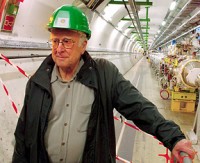Higgs search finds new particle

Scientists at Cern have announced results giving the strongest indication yet that the Higgs boson particle exists.
Newly analysed data from the underground facility near Geneva has discovered a new particle consistent with the Higgs boson, which was first postulated by the University’s Professor Peter Higgs.
"Scientists at Cern are to be congratulated on today’s results, which are a great achievement for the Large Hadron Collider and other experiments leading up to this." Professor Peter Higgs, Emeritus Professor, The University of Edinburgh
Tiny yet key particle
Professor Higgs developed his theory of the particle that bears his name when he was a researcher at the University in the early 1960s. Since then, the Higgs boson has formed a crucial strand of particle physics theory. It is thought to be a tiny yet key particle that enables all other particles to have mass.
Physical universe
The Higgs is a missing link in the standard model of physics, a theory that defines our understanding of the physical world. If the particle exists, it validates our understanding of fundamental physics.
"The efforts of our team at Edinburgh have helped make these results from Cern a reality. We are very proud to have contributed to these findings." Dr Victoria Martin, Lecturer, School of Physics and Astronomy
University input
Some 15 scientists from the University are involved in the research at Cern, including some whom were taught by Professor Higgs. The LHC smashes protons together at high energy, to recreate the conditions that existed just after the big bang.
Complex experiments
Under these conditions, Higgs bosons may be produced, but these decay almost as soon as they are formed. Scientists search instead for other particles left behind by the Higgs’ decay. For every billion proton collisions, about 1 Higgs bosons would expect to be seen - so scientists have to carry out myriad experiments and then dig deep into their data to find evidence of the particle.
"This is truly an exciting time and comes after many years of hard work." Dr Phil Clarke, Reader, School of Physics and Astronomy

